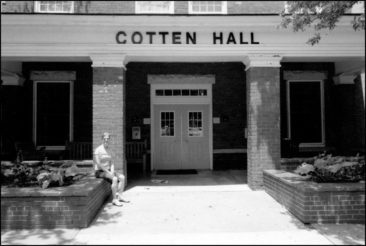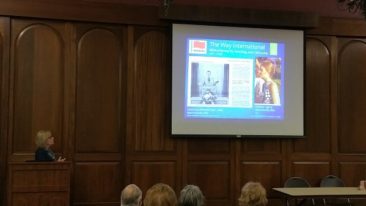
When I Was a Fish
What? In local venues, especially at colleges, once in awhile I give “Book talks with Q&A.” My goal is to use my book, Undertow, to shed light on the often-hushed-up topic of high-control groups commonly called “cults.” If you’re in one, or even if you’ve left one, often you don’t know it. Fish do not know they live in water. Their environment is natural to them. That kind of self-awareness is not part of their existence. For about seventeen years, I was a fish.
When hearing I’ll give a talk, certain people (I won’t name names, but they speak at the front of college classrooms) have asked me, “So, what’s your opening joke?” Up until this week, I’ve always said, “Sorry, I haven’t come up with anything funny to say. This is such a serious topic, I’m at a loss for funny.” But thanks to recent events, I am happy report that finally, with help from my husband, I’ve got something. Whether it is funny or not, you’ll have to tell me. But it’s from one of the greatest philosophers of all time, baseball hall-of-famer, Yogi Berra. “You’ve got to be very careful if you don’t know where you are going, because you might not get there.”
Maybe we’ll understand that by the time we finish this blog post which is from the most recent version of my presentation. I’ve evolved over time; naturally, so have my public talks. The following iteration is a summary of my story, so imagine it as a view from 30,000 feet.
At the end of this post, check out the photo gallery. BTW, I’ve learned that some people didn’t know these blog posts come from my website at https://charleneedge.com. All blog posts are stored there for posterity! On the Home page, click the Blog Categories heading, and select the category of posts you want to read.
Note: When I give this talk, I have a PowerPoint presentation with photos and bullet points of info that go along with it.
A cautionary tale
As you may know, my story is a cautionary tale of inner-circle experiences in The Way International, what recruiters told me was a biblical research, teaching, and fellowship ministry. It was and still is in business today as a non-profit.
First, a little saying to keep in mind. It will probably sound like common sense, but sometimes we forget it when we’re faced with sensational news stories about “crazy fringe groups” and see movies about “weird cults.” “Cult” is a label thrown at various groups as if it were Yogi Berra’s baseball. I urge restraint. I want to remind us that some groups harm some people some of the time. Remember that word, some.
Not everyone who was ever involved with The Way, even those who were in it during the same time that I was—from 1970 until 1987—had the same experience. In my cult, many people close to the leader fell under his direct influence, manipulative tactics, and sly propaganda. Others, who simply attended a home fellowship once a month, usually carried on what we think of as a normal family life and held down regular jobs. They were not subject to the top leader’s manipulation of their lives. So, let’s keep that in mind, too.
The Way International — a fundamentalist cult
While I met some loving, intelligent, and talented people in The Way, and learned some valuable skills, overall, what I experienced turned out to be devastating. For reasons I’ll make clear, I now consider the group a fundamentalist cult. Those two parts of The Way – fundamentalism and cult manipulation – are what I try to bring to life in my book, Undertow.
A few things about cults
If you think cults were a phenomenon in the distant 1960s and 1970s when baby-boomers like me wore bell-bottoms, think again. The International Cultic Studies Association, a global network concerned about psychological manipulation and abuse in high-demand groups, reports “Research studies suggest that about one percent of the U.S. population (three million persons) have been involved in cultic groups at some time in their lives. We estimate that about 50,000 – 100,000 people enter and leave cultic groups each year. Similar percentages appear to hold true for Western Europe.”
Cults have not disappeared and nobody consciously joins one. A person “joins” a group that offers something they need or want, like friendship, love, promises of healing, guarantees of self-improvement, a powerful Christian community, or knowledge of “the accuracy of God’s Word,” which is what The Way promised me.
More about cults
Why do some groups harm some people some of the time? Because of an imbalance of power. An authoritarian cult leader with a narcissistic agenda who has easy access to members, can possibly, and is likely to, abuse his or her followers. That can be a warning sign of a cult in progress.
In our society today, we hear the word cult used to describe dangerous groups like the People’s Temple whose members drank poisoned Kool-Aid in a mass suicide in Jonestown, Guyana, forty years ago this year. Do all cults end up like that? No, Jonestown is an extreme example. Many other groups, including The Way, are not that outwardly repulsive.
So, how do we know when we’re dealing with any sort of cult? Many sources helped me understand what a cult is, and that I’d been in one—not something I admitted when I first left The Way. The word cult had such an evil connotation, I fled from any suggestion I had been an integral part of cultic system of abuse. I’d thought I’d unfortunately ended up in a bad Bible-oriented organization. Then I did some digging.
Is there a definition for cult?
The definition of cult I cite in the Preface of my memoir, Undertow, is from Dr. Benjamin Zablocki, professor of sociology at Rutgers University who has published widely on the subject. He says a cult is, “An ideological organization held together by charismatic relationships and demanding total commitment.” This is a very basic definition.
Here’s another one I found helpful: it’s from Michael Kropveld, founder and director of InfoCult, likewise involved in studying charismatic, high-control groups. He writes, “As much as I encourage a nuance approach to defining the term cult and understanding the cult phenomenon in general, I think we would all agree that there are groups that do harm … contributing factors include a group’s location, the nature of its leadership, and at what period in its history we are looking at it. In fact, it has been observed that members of groups can be harmed in different ways, including psychologically, physically, and financially.”
Writing my cult story
I was harmed in each of those ways, but I am writing now as a person fortunate to have recovered—at least enough to write this—thanks to the gifts of time, education, and love. My memoir, Undertow, took me more than ten years to write. Even before I escaped The Way in 1987, I’d begun writing to sort out what was happening and how I felt, which brought me healing and understanding. Those first drafts were my therapy. The material that I eventually shaped into the book was not intended as an exposé of The Way, but as my personal story of involvement to help escapees like me to heal, and to help outsiders understand how such experiences happen.
Cult leaders & their cults
To understand a person in a cult, I think we need to get some information about the cult leader. In my case, Dr. Victor Paul Wierwille, who started The Way in Ohio during the 1940s and 50s, had rejected his training at seminary to start his own group where he could teach what he wanted. He said he had keys to unlocking “the accuracy of The Word.” He made the Bible the supreme religious symbol of his group, and he went so far as to insist that the “written Word” takes the place of Christ on earth. In case you haven’t guessed, I have rejected his so-called “accurate” teachings.
Inerrancy – true or impossible?
In my view, Wierwille was not only a cult leader; he was, in certain aspects, a fundamentalist. His teachings were a mix of a lot of “isms” — Literalism, Fundamentalism, Millennialism, Pentecostalism, Evangelicalism, Gnosticism, and what I call, self-help “ism.” In this talk, I want to focus on a particular aspect of his fundamentalism because it is what I encountered up-close and personal right before I escaped. What aspect? Inerrancy of the Scriptures. Despite there not being any original texts of Scripture in existence, Wierwille maintained a non-negotiable belief that the Bible in its original form was inerrant—without error. In my opinion, this belief is to blame for untold schisms in the Christian church and in devoted families everywhere. Due to my experience in The Way’s own biblical research department, inerrancy became impossible to believe.
I go into all of this in detail in my book. Like most stories that warn about a clear and present danger, mine is complicated, so for this talk, I will focus on how I was recruited.
A little background about me
In 1970, at East Carolina University in Greenville, North Carolina, I was looking for more than a college education. I was wholeheartedly seeking fellowship with like-minded Christians and wanted more knowledge of the Bible. Why? I was raised by devout Roman Catholic parents who sent me to Catholic school for eight years. My religious education was 24/7. We didn’t put the Bible at the center of our religious practice, although we revered it as inspired by God. No, our religious authority was the Pope and about two thousand years of Catholic church traditions. Not until I was in high school did I notice a New Testament at home tucked in the book case in our living room. Never had I seen my parents read it. Instead, I saw them saying the rosary and reading the church prayer book that included some readings from Scripture and the liturgy for Sunday mass.
What drove my interest in the Bible?
In 1968 tragedy struck my devout Catholic family—at forty-eight years old, my mother died of cancer. I was sixteen. My sister was married, living far away. My father was at a loss. As for why my mother died, I understood from the Church that God had decided it was time for her to go to heaven. I didn’t resign myself to that explanation. Instead, I was outraged. You mean God, who was supposed to love me, took away my own mother? How could God need my mother in heaven more than I needed her on earth?
In my grief and confusion, I decided I didn’t need a God who took mothers from teenage girls.
Young Life
A year later, a girlfriend invited me to a fellowship sponsored by Young Life, an Evangelical Christian group that motivates young people to get born-again, turn their lives over to Christ, and (at that time) study a version of the New Testament called, Good News for Modern Man. Bible study suddenly became all-important to me. I clung to my new Protestant family of loving leaders and born-again friends, enthusiastic about the Bible and the Lord. From them, I understood that Jesus led my every step. I could trust him to provide me everything, even to get me into the right college.
East Carolina University
In the fall of 1970, I moved into Cotton Dorm on the East Carolina campus looking for more than a college degree in English or Art History, the two majors I was interested in. When fellow students, recruiting for Wierwille, invited me to their fellowship, I believed God had worked behind the scenes to answer my prayers. The Way’s zealous like-minded believers were enthusiastic, kind, and showered me with love. They were serious about knowing and obeying God’s Word—my kind of new friends.
Victor Paul Wierwille & God?
What hooked all of us on Wierwille instead of another minister? For many of us, it was his claim of audible revelation from God. Wierwille said that God “said he would teach me the Word as it had not been known since the first century if I would teach it to others.” By the term “The Word,” Wierwille meant the original Bible. Not until years later did I find out the Bible was not even put together until after the first century. So much for that claim. Either God didn’t know his history, or Wierwille was telling a tall tale.
Wierwille’s Bible class
I paid my “minimum donation” and took Wierwille’s Bible class called Power for Abundant Living. The green registration card listed benefits the class offered us: “overcomes fear and worry, explains apparent Bible contradictions, enables you to separate truth from error, and teaches you how to pray effectually.”
Soon after meeting Way recruiters in September 1970, I rejected every warning from my family and my old friends and jumped into Way classes held off campus at a house owned by The Way. I accepted Way teachings as “the accurate Word of God” from zealous believers I barely knew, and soon, believing that God told me to, I jumped out of college. Convinced that God had brought me to Wierwille’s ministry to become a leader and spread his teachings over the world, I gave it the next seventeen years of my life.
What happened?
Many of us came to consider Wierwille our “father in The Word.” He called us his kids. I underwent his intensive two-year training program called, The Way Corps, designed to produce loyal leaders. I ignored warning signs of his increasing paranoia and abuse—among other things, he condemned dissenters as the Devil’s agents; as a loyalty test, he required Way Corps members to watch pornography; he manipulated Way Corps into keeping his secrets in a “lock box;” he denied the Holocaust; and he surrounded himself with armed bodyguards. I married an ordained Way Corps graduate, and we served across the United States as Way leaders, funneling believers’ donations and class fees into Wierwille’s bursting coffers and shunning anyone who criticized him.
Critics
Besides criticizing his unorthodox teachings, like Jesus is not God, and four thieves were crucified with Jesus, not two, and that all believing equals receiving (meaning what you pray for you receive if you believe. If you don’t receive, then it’s your fault for not believing! This is part of today’s Prosperity Gospel hawked by televangelists)—other criticisms from outsiders flew about his private life: he drank too much, he invited young Way Corps women to travel in his motor coach with him, he used believers’ money to buy those motor coaches, several training-center properties, and an airplane—all justified in the name of “moving God’s Word around the world.”
When, in 1976, Wierwille warned of a possible government takeover, we prepared to live off the grid: we stockpiled food, and bought a couple of rifles to shoot rabbits for a campfire style existence. As obedient Way Corps, we raised our child to believe the doctrines of Wierwille.
The fish leaps out
By 1984, about 600 believers were working at Way headquarters in Ohio. I was promoted to the inner circle of biblical researchers working there fulltime. While in that department, I discovered devastating secrets: Wierwille twisted texts of Scripture to serve his personal agenda, shamelessly plagiarized the work of others, and misrepresented the purpose of his organization—it was not doing objective biblical research, it was kowtowing to Wierwille.
Worst of all, after Wierwille died in 1985, shocking reports surfaced of an “alleged” secret sex ring he had conducted for more than a decade among Way Corps women (first-hand accounts were published years later in at least two books cited in my book). In 1987, amidst chaos and leadership power-grabs at Headquarters, I knew I had to escape—for my own survival and my child’s.
Cult warning signs
Here are just a few things to watch for regarding controlling groups
1. Charismatic, authoritarian, self-proclaimed prophet with NO check on power
2. Sincere yet deceptive recruiting
3. Criticism of the leader and the teachings are viewed as “persecution”
4. Psychological manipulation, exploitation, abuse: emotional, sexual, and financial
What can we do when recruiters approach?
1. Always research the group
2. Be firm and respectful when refusing recruitment
3. Challenge anything that sounds irresistible – promises of wealth, enlightenment, etc.
4. Don’t tolerate deception, even from a friend
5. Follow the money
6. Protect your autonomy
Chapter 3: Brought In
Before I invite questions from the audience at talks, I read parts of Chapter 3 which depicts the circumstances of my recruitment on the campus of ECU in September, 1970.
Take-away from this post? Watch where you’re going, and if you’re fortunate, you can get there.
See you next time!
Your writer on the wing,
Charlene










Hal Smith
This is well written and so captivating ! Nancy Cezario 5th corps and I {Hal Smith F7} lived it along with you. We left in 87 while in South Carolina with Gary and Anne Matsuk…..lots of drama during those days.
Charlene L. Edge
Hi Hal, thanks for checking in. Aren’t we glad those drama days are over?!
Don Glenn
There is an urge for some of us who are seekers to find the true source . Is it in the bible or some concregation. Could it be in meditation, in Buddhism or The Tao. There are just so many different avenues. Thanks for sharing your travels.
Charlene L. Edge
Hi Don, thanks for commenting here. There sure are many paths to finding peace. These days, my journey has taken me into contemplation I find in meditation. Side benefit — it has enriched my writing life!
Ralph Dubofsky
Thanks Charlene! Another informative blog post. Glad to see your continued commitment to keeping people free from high control “spiritual” booby traps like The Way. Your work has and will continue to enable critical thinkers to discern the various psychoemotional gimmicks cults all use to manipulate idealistic, altruistic human beings to abandon rational thinking and allow themselves to be manipulated into oblivion. Thanks for your work and your dedication to it.
Charlene L. Edge
Appreciate your comments here, Ralph. We both know close-up how such a group works to control people!
Linda Goddard
Hi Charlene,
Your piece here is so well written and informative. I’m always grateful for your genuine thoughts and your courage to share your personal journey through this very complex experience, and your coming through this corrupt cult, which is corrupt on many levels.
And your fish metaphor really speaks to me.
As the result of being born and raised in the North East, I have come to realize that I grew up, “like a fish who doesn’t know it lives under water,” with a psychologically internalized lie that we people in the North were not racists, in spite of our white priviliged comments, our white privileged beliefs, and our while privileged conversations about racism, which we thought were enlightened, intelligent views. All this while the National Guard had to be called in to integrate the schools, and racial riots were breaking out in the streets, and bombs going off on the lawns of white homeowners who showed their homes for sale to Black families.
All of these racist actions were in my face and all around me during my growing years, so how could I have internalized such warped beliefs?
The question I keep asking is how does phycological menipulation begin to enter, take hold, and control one’s life?
Charlene L. Edge
Hi Linda, thanks for sharing here. My best guess in answer to your last question is that we are simply … human.
Kallie Peckham Scharnitzke
Hi Charlene
I’m a graduate of the 15th Corps . I parted ways with TWI in 1988, actually was “kicked out ” . Got out just before things really started being exposed and the mass exodus of the early 1990’s .
I also had experienced a devastating life event when I was 18 and witnessed the suicide of my older brother . Since I had grown up without a present father because of divorce , my brother was my “father figure ” and one of the most influential male role models in my life . I worshipped the ground he walked on .
I have a family member that became involved with TWI during their college years and is still an active member on staff at HQ . I was exposed to the tea hings of VPW @ around 10 yrs of age and was taught how to speak in tongues along with my brother during a summer break from college my family member spent at home .
Shortly after my brother’s suicide , my mother contacted this family member and asked if I could come visit them for awhile . Arrangement were made and I moved to Ohio and worked on staff . That was in October of 1980 . I took the PFAL class in January of 1981 , went WOW in August and applied for the 14th Corps. I didn’t meet the requirements to go in the 14th Corps , so applied for the 15th Corps and was involved until 1988 . The things I was exposed to and experienced during those years were devastating to me . When I went to leadership about situations I was told to keep my mouth shut . But , I stayed a loyal follower at the time. I’m thankful I saw the Mi is try for what it was and got out .
The confusion and pain that followed after that during the next several years took a long time to heal from . I’m so thankful cor your work and truth of exposing TWI for what it truly was and is…..it continues to justify what I know to be truth ,even when my closest family members refused to believe me and accused me of lying about my experience.
I have moved on and am happy and healthy and have healed from the control and abuse I also experienced . Keep up your good work.
KLS
Charlene L. Edge
Dear KLS,
First, my heart goes out to you over the terrible loss of your brother. Thank you for sharing a little of your story here. It’s a shame you underwent the devastation you describe here about the time you were associated with The Way. Please know I send you very best wishes for continued healing and peace.
Charlene